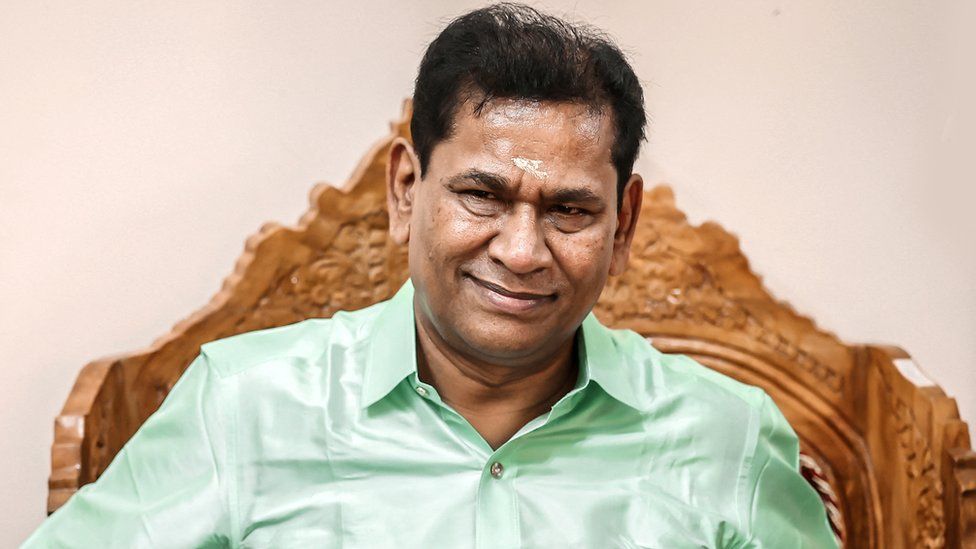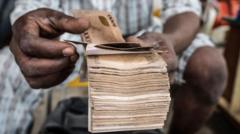
Santiago Martin's lottery empire stretches across several Indian states
By Imran Qureshi
BBC Hindi
An Indian man who made a fortune by selling lottery tickets is in the spotlight after he was revealed to be the top donor to political parties under a controversial funding scheme.
Santiago Martin's company, Future Gaming and Hotel Services Pvt. Ltd, bought electoral bonds worth 13.68bn rupees ($165m, £130m) between April 2019 and January 2024 under the scheme which allowed political donors to remain anonymous - until the Supreme Court recently scrapped the scheme and ordered their names to be published. While donations under this scheme were not illegal, electoral bonds have been accused of making political funding more opaque.
Since then, it has emerged that of the bonds bought by Mr Martin's company, more than 5bn rupees went to the regional Dravida Munnetra Kazhagam (DMK) party which governs the southern state of Tamil Nadu where Mr Martin started his business. It's not clear yet who the remaining recipients are.
A closer look at Mr Martin's life reveals a fascinating rags-to-riches story, as he went from working as a daily-wage labourer to running a lottery empire that stretches across several Indian states as well as the neighbouring country of Bhutan.
But Mr Martin, 63, is also seen as a controversial figure - he has been dogged by political scandals and has been accused by authorities of being involved in financial irregularities including lottery fraud.
Mr Martin has not given any public statements since the electoral bonds data was published. The BBC has emailed Future Gaming and messaged Mr Martin's wife, Leema Rose Martin, but has not received responses yet.
Reports say Mr Martin was born in 1961 in the Andaman islands off India's east coast. As a teenager, he is believed to have worked as a daily-wage labourer in present-day Myanmar. In the1980s, he returned to India and began working in a tea shop in Tamil Nadu.
Image source, Getty Images
Image caption,Only 13 Indian states allow lottery tickets to be sold
He was struck by the popularity of lottery tickets among all sections of Tamil Nadu's population, but especially the poor. It prompted him to start the business which would make him a millionaire.
Mr Martin opened his first shop in Coimbatore city and within a few years, overtook two competitors to become the biggest seller of lottery tickets in Tamil Nadu.
Mr Martin scaled up the sales of what were known as "two-digit" lottery tickets - scratch cards which revealed two digits that the buyer could instantly check against winning numbers revealed through a live telecast facilitated by his company.
A political observer who spoke to the BBC on condition of anonymity recalls seeing people crowding before small shops, watching lottery draws on "the smallest of TV sets".
The draw of instant money led to higher sales - and, critics say, drove many into ruin.
Mr Martin's lottery tickets soon found a market in neighbouring Karnataka and Kerala states, and he later expanded the business to northern and north-eastern India.
In a 2001 interview to rediff.com, Mr Martin said that he sold 12 million lottery tickets every day. By then, his company had agreements with several state governments for distributing lottery tickets.
The article claimed that Mr Martin paid massive sums every day - 350,000 rupees in sales tax to the Tamil Nadu government and 759,000 rupees in advance to the government of the north-eastern state of Sikkim - underscoring the thundering success of his business.
"I succeeded because I grasped the psychology of the buyer and the tricks of the trade," he said in the same interview.
But the article also noted that Mr Martin was facing an investigation by the income-tax department - charges listed against him included claiming the prize money from unsold tickets and rigging lottery draws. Mr Martin's associates dismissed the allegations, accusing his rivals of teaming up with politicians to destroy his business.
In 2003, Tamil Nadu's then chief minister, J Jayalalithaa, banned the sale of lottery tickets, acting on reports of people being financially ruined due to lotteries. This was a huge blow to Mr Martin.
Santiago Martin arrives at a Tamil Nadu court in 2011
In 2011, again when Jayalalithaa was in power, he was arrested and spent some months in jail in a case related to land-grabbing before getting bail.
Mr Martin's company also faces cases of lottery fraud in states including Kerala. In 2023, India's financial crimes unit said it seized assets and bank deposits worth 4.5bn rupees after searching properties belonging to him and his associates in a case related to lottery fraud in Sikkim state.
Mr Martin's appeal against the order was dismissed by a court the same year. He has not been convicted in any of the cases against him yet.
Mr Martin has not spoken to the media about the allegations, but his company's website states that Future Gaming "is known for its compliance towards rules and regulations" wherever it conducts business.
According to the website, Mr Martin has also diversified his business into sectors such as real estate, hospitality and steel.
Even before the electoral bonds revelations, the businessman had made news for alleged connections with political parties.
In 2007, a political scandal broke out in Kerala state when then communist chief minister VS Achuthanandan spoke out against his party's newspaper accepting a donation of 20m rupees from Mr Martin - the party finally returned the money.
At the time, Mr Achuthanandan had launched a crackdown on illegal lotteries in the state.
"His reasoning was that common people were losing lots of money and that there were many who had even died by suicide because they could not bear the losses they incurred from lotteries,'' Joseph Mathew, who was an adviser to Mr Achuthanandan, told the BBC.
In 2011, Mr Martin produced a Tamil-language film based on Maxim Gorky's novel Mother, for which DMK's leader and former Tamil Nadu chief minister M Karunanidhi wrote the script. Reports say the film's budget was around 200m rupees, but it mostly received negative reviews.
In 2019, MK Stalin, who is now the chief minister of Tamil Nadu, filed a defamation case against a popular magazine called Junior Vikatan after it published a story accusing him of "negotiating a deal of 5bn rupees" with Mr Martin as donations for the DMK. Mr Stalin denied this, calling it a "figment of imagination of Vikatan" and that Mr Martin had never donated to his party.
The electoral bonds data has now led the DMK's rivals and political observers in Tamil Nadu to question why the party received donations from Mr Martin when lotteries are banned in the state. A DMK spokesperson did not respond to the BBC's messages, but the party has said its government has made no concessions for Mr Martin's company.
Mr Martin's family members also have ties to different political parties - his son-in-law is a member of the Viduthalai Chiruthaigal Katchi (Liberation Panthers Party), which is part of a Congress-led opposition alliance against the Bharatiya Janata Party (BJP), while his wife Leema has joined the Indhiya Jananayaga Katchi (Indian Democratic Party), which is an ally of the BJP.












 English (US) ·
English (US) ·  Turkish (TR) ·
Turkish (TR) ·